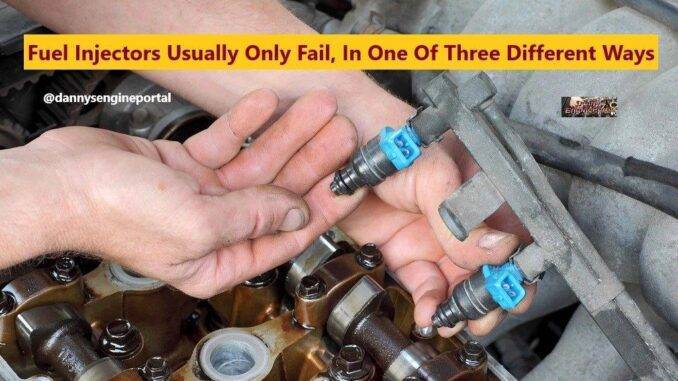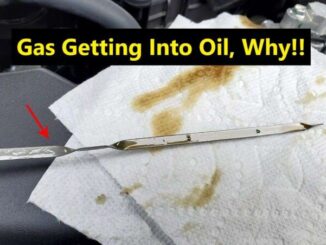
So, today’s fuel injectors are a vital part, of a complex fuel management system.
Fuel injectors, are basically a spray nozzle, that atomizes the fuel. Then, performs the final stage of delivery, to the engine.
So, if the fuel injectors are not operating properly, then other parts of the engine will be affected as well. In addition, if its job is thrown off, by restrictions electrical problems or fuel problems, then it can cause driveability issues.
In addition, new technology has made fuel injectors more precise than ever, in dispensing fuel.
Fuel Injectors, How They Work
Consequently, vehicles regulate your speed and acceleration, by varying the ratio of the fuel, and the air entering the engine.
In order to provide the right amount of fuel, the (ECU) is equipped with, a whole lot of sensors.
Fuel injectors deliver fuel to the combustion chamber, directly or indirectly. During its evolution the fuel injector has moved from the intake manifold, to the combustion chamber.
Common Types Of Injectors Include:
- Throttle Body Injection (TBI)
- Multiport Fuel Injection (MFI)
- Sequential Fuel Injection (SFI)
- Gasoline Direct Injection (GDI)
- Port Fuel Injection (PFI)
A Fuel Injector Will Usually Only Fail, In One Of Three Ways:
1. From Being Dirty Or Clogged
Consequently, over time the nozzle of the injector can become, dirty or clogged. So, when you shut off your engine, the injector will soak up heat from the engine.
This causes any fuel left in the injector to evaporate, leaving behind hard deposits, inside the injector. Over time, these will eventually, block the injector.
2. Leaking Externally Or Internally
So, the most common cause of leaking injectors, is the failure of the O-ring. And, is usually where the injector, meets the fuel rail. The O-ring can become, hard and brittle, from the heat of the engine.
If it breaks, then fuel can leak out, over the engine. The other way an injector will leak, is if the injector body or nozzle cracks.
3. From A Mechanical Failure
There are many moving parts, inside an injector and over time, they can fail. As a result, of normal wear and tear or lack of maintenance.
Possible Signs Of Fuel Injector Issues, Include:
- Hard Starting, when engine is hot
- Poor idle
- Failed, emissions test
- Poor Performance
- Engine does not reach full (RPM)
- Increased fuel consumption
- Rough, engine performance
- Surging and bucking, under various throttle loads
- Smoke from the exhaust
- Oil thinning, which can lead to, complete engine failure
- Engine Knock or Detonation, which can lead to, complete engine failure
- Pollution
Tracking Down The Problem
Hook Up An (OBD-II) Code Reader
So, when looking for problems, always start by hooking up an (OBD-II) code reader. This will tell you, if the (ECU) has logged any errors. If an engine misfires because of a bad injector, there will be an error code. And, that code, will point to the injector in question.
If you are using a “generic” code reader, then you can expect to see codes, beginning with P02. (generic, not vehicle manufacturer specific). For example, a fault with an injector in cylinder one, would give a code of P0201. These are all, fuel & air metering injector circuit related codes.
Listen To The Fuel Injectors
Another helpful diagnostic tool, is an mechanic’s stethoscope. This tool enables a vehicle owner, to listen for any problems with the fuel injectors. And, is done by placing the tip of the stethoscope, on each injector.
Fuel injectors, make a sharp clicking sound, when they are working properly. So, the absence of this sound, can indicate a problem, with an injector.
How To Prevent Fuel Injector Problems
In general, fuel injectors are hard wearing and with a little care, can often last, the life of the engine. Like any other engine part, regular maintenance is the key, to keeping them going. So, if you plan on running up high mileage, then there are a few things you can do to help.
Regular Inspection And Cleaning
So, there is a way to keep your injectors, in good working order. And, that is to have them, removed and inspected at regular intervals. Under normal circumstances, that would be, every 25,000 miles or 40,000 km. However, if you tend to do a lot of short trips. Then, you’d probably want to have them looked at more often, to prevent the build up of deposits.
Use Of Fuel Additives
Another great way to keep injectors in good health, is to regularly add, a fuel injector cleaner. You just add it, to your fuel tank. Many manufacturers claim that these additives, will give your engine, extra power or added mpg.
They probably won’t, or make much difference, to a engine that is running properly. I usually do not recommend additives, but this is one area that does help.
Regular Engine Servicing
Regular oil and filter changes, will go a long way, towards maintaining a healthy engine. If an engine isn’t running efficiently, this can load extra pressure on injectors. It’s also important, to regularly change the fuel filter, to ensure a proper fuel flow.
Driving Habits
Driving a vehicle hard, along with short start stop trips, will increase the wear and tear on injectors. Letting the engine cool down, before turning it off, will increase the life of the injectors. As a result, a well kept fuel injection system, will keep your vehicle going for years.
Sometimes A Faulty Fuel Injector, Can Be Repaired:
Leaking Injector
If the O-ring fitted to the injector is the problem, then replacing this O-ring, will usually fix the fuel leak. If the injector body, nozzle or internal parts are cracked, then a new or refurbished injector, is your only option.
Replacement fuel injector seals and washers are cheap, and are fairly easy to install. This can often fix the problem, and if you are handy with a wrench, it’s not that difficult to do.
Dirty Injector
It is fairly inexpensive, to have your fuel injectors cleaned, and overhauled by a professional. This involves inspection and cleaning of the injector. That’s why, it is recommended that you should get them cleaned, at regular intervals. Also, to help prevent problems, down the road.
It can also be a good idea to run, a fuel system cleaner through your engine. Usually, a couple of times a year. This will help to keep injectors, fuel pumps and fuel lines, clean and clear, of carbon build up. It will also, increase the service intervals of the injectors.
Clogged Injector
Clogged injectors, can usually be repaired, if you catch the problem quickly. Sometimes a fuel injector, is completely clogged, because of years of neglect or a lack of, regular engine servicing. If this is the case, then a refurbished replacement, may be the only option. Again, regular use of a fuel system cleaner, can help to prevent, clogged injectors.
Conclusion
So, fuel injectors, do not last forever. But, you can take steps, in making them last, as long as possible. Also, fuel injectors are, a very important part of modern vehicles. Not only do they deliver fuel to your engine. But, they do so in a manner that is, efficient as possible.
This not only gives vehicles, better fuel mileage. But, it also cuts down on the pollution that they emit, in comparison to older technologies. When something goes wrong, with this sophisticated technology, it can feel intimidating for many vehicle owners. As a result, leading them to often take their vehicles, for a professional diagnosis.
BY DANNY BENDER




